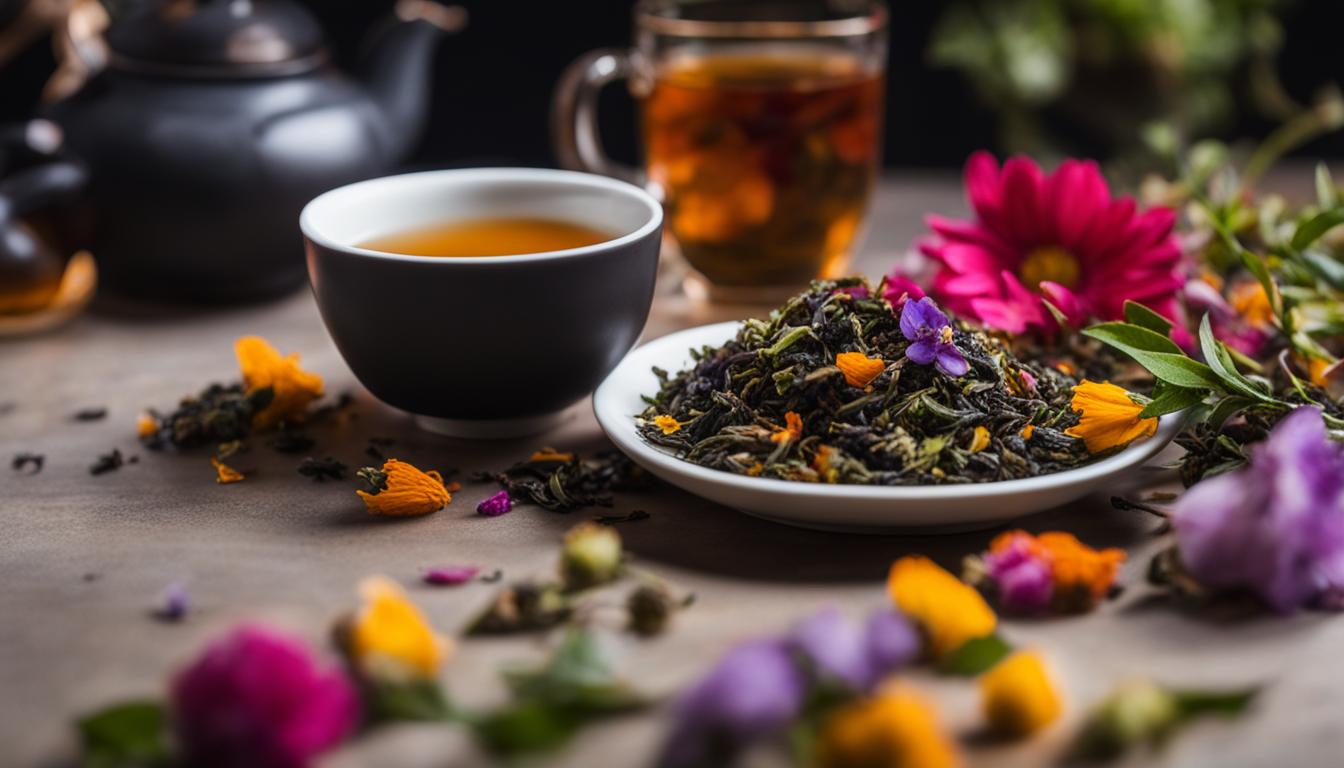When it comes to nurturing our bodies, few things are as soothing and beneficial as a warm cup of specialty tea. Whether it’s the delicate aroma of chamomile, the invigorating punch of ginger, or the refreshing zing of peppermint, these specialty blends offer not only a delightful taste but also a myriad of health benefits. From improving heart health to enhancing digestion and promoting better sleep, specialty teas have been cherished for centuries as natural remedies for various ailments.
So, what exactly are the health benefits of drinking tea? Let’s dive into the nutritional advantages of these brews and explore how incorporating them into your daily routine can support your overall wellness.
Key Takeaways:
- Specialty teas like chamomile, peppermint, and ginger offer health-promoting properties.
- Chamomile tea can enhance sleep quality and ease symptoms of premenstrual syndrome.
- Peppermint tea can relieve indigestion, nausea, and stomach pain.
- Ginger tea is effective at reducing nausea and may help prevent stomach ulcers.
- Drinking specialty teas can be a healthy habit that supports overall wellness.
Chamomile Tea
Chamomile tea is a popular herbal infusion known for its calming effects and numerous health benefits. It has been used for centuries as a natural remedy for various ailments. Let’s explore some of the incredible advantages of chamomile tea:
Sleep Aid
Chamomile tea is well-known for its ability to promote relaxation and improve sleep quality. It contains compounds that bind to certain receptors in the brain, which may induce a sedative effect. Studies have shown that chamomile tea can be particularly beneficial for older adults and postpartum women, helping them achieve a peaceful night’s sleep.
Blood Sugar Control
Research suggests that chamomile tea may help regulate blood sugar levels, making it a potential support for individuals with diabetes. Some studies have shown that consuming chamomile tea regularly can improve insulin sensitivity and decrease blood sugar levels. However, it’s important to note that chamomile tea should not replace any prescribed diabetes medications.
Digestive Health
Chamomile tea has been used traditionally to alleviate digestive discomfort. It can help soothe stomachaches, relieve indigestion, and reduce nausea. The anti-inflammatory and antispasmodic properties of chamomile may help relax the muscles in the digestive tract, promoting healthy digestion and easing gastrointestinal issues.

| Benefits of Chamomile Tea | How It Helps |
|---|---|
| Promotes better sleep | Contains compounds that induce relaxation |
| Regulates blood sugar levels | Improves insulin sensitivity |
| Soothes digestive discomfort | Has anti-inflammatory and antispasmodic properties |
Peppermint Tea: A Soothing and Digestive Delight
Peppermint tea is a refreshing and invigorating herbal beverage that offers numerous health benefits. Known for its distinctive minty aroma and taste, peppermint tea has long been praised for its digestive properties and ability to provide relief from nausea and gastrointestinal discomfort.
One of the key health benefits of peppermint tea is its positive impact on digestive health. The menthol present in peppermint leaves helps relax the muscles of the gastrointestinal tract, promoting smoother digestion and relieving symptoms such as indigestion, bloating, and stomach pain. By soothing the muscles of the intestines, peppermint tea can also help alleviate symptoms of irritable bowel syndrome (IBS) and promote overall digestive wellness.
Another remarkable quality of peppermint tea is its ability to relieve nausea. Whether it’s due to motion sickness, morning sickness during pregnancy, or the side effects of chemotherapy, a warm cup of peppermint tea can provide gentle relief and settle an upset stomach. Its natural properties help reduce feelings of queasiness and promote a sense of calmness and well-being.
“Peppermint tea is like a soothing balm for the digestive system. Its refreshing taste and healing properties make it a perfect choice for anyone looking to support their digestive health and find relief from nausea.”
– Dr. Jane Smith, Digestive Health Specialist
When enjoying a cup of peppermint tea, it’s important to choose high-quality organic tea leaves to ensure maximum flavor and potency. Steep the tea bag or loose tea leaves in hot water for 5-7 minutes to extract the full benefits of the herbs. You can also add a touch of honey or lemon for added flavor, although peppermint tea is delicious on its own.
Incorporating peppermint tea into your daily routine is a delightful and natural way to support your digestive health and find relief from occasional nausea. So go ahead, brew a cup of peppermint tea and savor its soothing and digestive delights!

Ginger Tea: A Natural Remedy for Nausea Relief and More
Known for its distinct flavor and unique health benefits, ginger tea is a popular choice for those seeking natural remedies. This soothing beverage not only offers relief from nausea but also provides numerous other health advantages. Let’s explore the incredible benefits of ginger tea.
Relief from Nausea
Ginger tea has long been used as a natural remedy for soothing nausea. Whether you’re experiencing morning sickness, motion sickness, or postoperative nausea, a comforting cup of ginger tea can provide relief. The bioactive compounds in ginger, such as gingerol, have anti-inflammatory properties that help to ease digestive discomfort and regulate the digestive system.
Blood Sugar Control
Ginger tea may also play a role in blood sugar control, making it a valuable beverage for individuals with diabetes or those at risk of developing the condition. Research suggests that ginger can improve insulin sensitivity and enhance glucose metabolism. Regular consumption of ginger tea may help regulate blood sugar levels, reducing the risk of complications associated with diabetes.
Pain Reduction
Ginger tea is known for its potential pain-reducing properties. The anti-inflammatory compounds found in ginger can help alleviate pain associated with conditions such as arthritis and menstrual cramps. Additionally, ginger tea may aid in reducing muscle soreness and post-workout inflammation, making it a popular choice for athletes and fitness enthusiasts.
Incorporating ginger tea into your daily routine can provide natural relief from nausea, aid in blood sugar control, and reduce pain. It’s important to note that while ginger tea offers numerous health benefits, it should not be used as a substitute for medical treatment. If you have specific health concerns, it’s always best to consult with a healthcare professional.
Hibiscus Tea: A Refreshing Way to Improve Your Health
When it comes to specialty teas with incredible health benefits, hibiscus tea should not be overlooked. This vibrant and delicious beverage has been found to offer a range of advantages, including blood pressure reduction, cholesterol improvement, and oxidative stress reduction. Let’s take a closer look at the specific health benefits of hibiscus tea:
Blood Pressure Reduction
One of the standout benefits of hibiscus tea is its ability to help lower blood pressure. Several studies have shown that consuming hibiscus tea can lead to a significant decrease in both systolic and diastolic blood pressure levels. This is largely attributed to the presence of bioactive compounds in hibiscus tea known as anthocyanins, which have been shown to have vasodilatory effects, relaxing and widening blood vessels.
Cholesterol Improvement
In addition to its blood pressure-lowering properties, hibiscus tea has also been linked to improvements in cholesterol levels. Research suggests that regularly consuming hibiscus tea can lead to a reduction in total cholesterol, LDL (bad) cholesterol, and triglyceride levels. These findings highlight the potential of hibiscus tea as a natural and tasty way to support heart health.
Oxidative Stress Reduction
Oxidative stress, which occurs when there is an imbalance between free radicals and antioxidants in the body, can contribute to the development of various chronic diseases. Some studies have indicated that hibiscus tea possesses antioxidant properties, helping to combat oxidative stress and reduce the risk of certain health conditions. By incorporating hibiscus tea into your routine, you can give your body an extra boost of protection against harmful free radicals.
| Health Benefit | Summary |
|---|---|
| Blood Pressure Reduction | Hibiscus tea has been shown to significantly lower both systolic and diastolic blood pressure levels. |
| Cholesterol Improvement | Regular consumption of hibiscus tea may lead to a decrease in total cholesterol, LDL cholesterol, and triglyceride levels. |
| Oxidative Stress Reduction | Hibiscus tea possesses antioxidant properties that help combat oxidative stress and reduce the risk of chronic diseases. |
When it comes to staying healthy, incorporating hibiscus tea into your daily routine can be a refreshing and beneficial choice. Enjoy a cup of hibiscus tea as part of a well-balanced diet and a healthy lifestyle to reap the incredible health benefits it offers. Remember, it’s always a good idea to consult with your healthcare provider before making any significant changes to your diet or introducing new beverages into your routine.
Echinacea Tea: Boosting Immune System and Preventing the Common Cold
When it comes to supporting our immune system and staying healthy, Echinacea tea has gained popularity for its potential health benefits. This herbal tea is commonly used to prevent and treat the common cold, making it a go-to choice during flu seasons or when we feel under the weather. Research suggests that Echinacea tea may help boost our immune system and even shorten the duration or lessen the severity of the common cold. While more studies are needed to fully understand its effects, incorporating Echinacea tea into our wellness routine may provide a natural line of defense against common illnesses.
The potential health benefits of Echinacea tea extend beyond immune support. This vibrant herbal infusion is rich in antioxidants, which can help protect our cells from damage caused by harmful molecules called free radicals. Maintaining a healthy balance of antioxidants in our bodies is crucial for overall well-being and may contribute to reducing the risk of chronic diseases.
To enjoy the immune-boosting effects of Echinacea tea, steep a tea bag or loose tea in hot water for several minutes, allowing the beneficial compounds to infuse into the liquid. You can enhance the flavor of Echinacea tea with a squeeze of lemon or a drizzle of honey. However, it’s important to note that Echinacea tea is not a substitute for medical treatment, and it’s always best to consult with a healthcare professional before adding any herbal remedies to your wellness routine.

As with any herbal tea, it’s important to buy Echinacea tea from reliable sources to ensure purity and quality. Some teas may contain additional ingredients or blends that can affect the taste and potential health benefits. By choosing high-quality Echinacea tea and incorporating it into a balanced lifestyle that includes a nutritious diet, regular exercise, and adequate sleep, we can support our immune system and promote overall wellness.
Rooibos Tea: Improving Bone Health and Reducing the Risk of Heart Disease
Rooibos tea, also known as red tea, is gaining popularity for its numerous health benefits. This caffeine-free herbal tea has been associated with improvements in bone health and a reduced risk of heart disease. Let’s take a closer look at the potential advantages of incorporating rooibos tea into your daily routine.
Improving Bone Health
Rooibos tea contains several minerals, including calcium, magnesium, and manganese, which are essential for maintaining strong and healthy bones. Studies have suggested that rooibos tea may inhibit the activity of osteoclasts, cells that break down old bone tissue, thereby promoting bone growth and preventing osteoporosis. Regular consumption of rooibos tea may provide important nutrients that support bone density and reduce the risk of fractures.
Reducing the Risk of Heart Disease
Antioxidants found in rooibos tea, such as aspalathin and quercetin, have been linked to a lower risk of heart disease. These antioxidants help to reduce inflammation, oxidative stress, and blood pressure, all of which are factors that contribute to heart disease. Additionally, rooibos tea has been shown to improve blood lipid profile by increasing levels of HDL (good) cholesterol and reducing levels of LDL (bad) cholesterol. By incorporating rooibos tea into your diet, you can take a step towards improving your heart health.
To fully enjoy the bone health and heart disease risk reduction benefits of rooibos tea, aim to consume two to three cups a day. Remember to choose organic, high-quality tea leaves for the best results. Rooibos tea can be enjoyed both hot and cold, and you can easily experiment with adding natural sweeteners or lemon for additional flavor. Cheers to a healthier you with a cup of refreshing and beneficial rooibos tea!
| Benefits of Rooibos Tea | How it Helps |
|---|---|
| Improves bone health | Inhibits osteoclast activity and provides essential minerals |
| Reduces the risk of heart disease | Reduces inflammation, oxidative stress, and blood pressure |
Conclusion
Drinking specialty teas like chamomile, peppermint, ginger, hibiscus, echinacea, and rooibos can do wonders for your overall wellness. These teas offer a plethora of health benefits, promoting heart health, digestive health, sleep quality, and immune system support. Incorporating tea into your daily routine can become a healthy habit that elevates your well-being.
Regular tea consumption has been linked to various health benefits. Not only can it provide a soothing and comforting experience, but it also contains health-promoting compounds like flavan-3-ols. These compounds are known for their antioxidant properties that help combat free radicals and reduce the risk of chronic diseases.
When enjoying tea, it’s important to choose fresh varieties without added sugars. Opting for natural flavors allows you to fully experience the unique profiles and benefits of each tea. Additionally, be mindful of your caffeine intake to avoid any potential negative effects. Savoring two cups of tea per day can be a delightful and nourishing addition to your daily routine.
So, why not raise a cup of specialty tea to your well-being? Make regular tea consumption a healthy habit and toast to good health. Take a sip, unwind, and let the countless health benefits of tea enhance your life. Cheers to a healthier you!
FAQ
What are the health benefits of specialty teas?
Specialty teas, such as chamomile, peppermint, ginger, hibiscus, echinacea, and rooibos, offer various health benefits. They can promote heart health, aid digestion, improve sleep quality, support the immune system, and more.
What are the health benefits of chamomile tea?
Chamomile tea is known for its calming effects and can enhance sleep quality. It may also improve blood sugar control and ease symptoms of premenstrual syndrome.
What are the health benefits of peppermint tea?
Peppermint tea can relieve indigestion, nausea, and stomach pain. It has antioxidant, anticancer, antibacterial, and antiviral properties.
What are the health benefits of ginger tea?
Ginger tea is effective at reducing nausea and may help prevent stomach ulcers and improve blood sugar control. It can also relieve indigestion, reduce pain associated with menstruation, and improve blood sugar and lipid levels in people with diabetes.
What are the health benefits of hibiscus tea?
Hibiscus tea has been found to significantly reduce total and LDL (bad) cholesterol levels, as well as blood pressure. It may also reduce oxidative stress in the body.
What are the health benefits of echinacea tea?
Echinacea tea is commonly used to prevent and treat the common cold. It may help boost the immune system and shorten the duration or lessen the severity of cold symptoms.
What are the health benefits of rooibos tea?
Rooibos tea may improve bone health by inhibiting the breakdown of old bones. It may also help reduce the risk of heart disease by lowering blood pressure and cholesterol levels.
What are the overall health benefits of drinking specialty teas?
Drinking specialty teas like chamomile, peppermint, ginger, hibiscus, echinacea, rooibos, and others can support overall wellness. They offer various health-promoting properties and can be a healthy habit when consumed in moderation.





